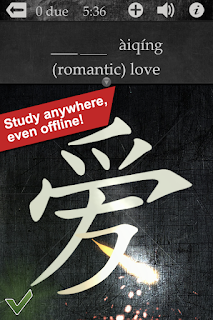On Saturday, May 5th 2012, after a grueling week of midterm exams, reports and 15 hours of regular classes, I went in to take Taiwan's TOCFL Exam, formerly known as the TOP. I was registered for the Master Level, also know as the fluency level.
I went into the exam with little hope of passing, but since I have to take (and pass) the exam before I graduate from my Master's program here in Taiwan, I wanted to see what this exam was all about so that I could better prepare myself for next time. I had bought a test booklet to prepare, but the prep booklet doesn't do much good in my opinion, since the material presented always feels about a step or two down from the actual level of material presented on the exam.
The exam is done on the computer, with your results processed instantaneously. Sure enough, after two hours of testing, split into listening and reading, I pressed send only to find those dreaded words "no pass" appear across the screen. However, much to my surprise I was only one point shy of grabbing the master level score, so where did I go wrong?
I would say that my largest problem was that I was simply not prepared for the scope of questions that appeared on the exam. The content was a mixture of news broadcasts, advertisements, business meeting conversations etc., and I simply didn't have enough background to fill in the gaps between the words I didn't know and what they were looking for in the questions provided. I fared a lot better on the reading section of the exam, but the speed at which I read was simply too slow for the allotted time given. With only one minute left in the test I had 10 questions left unanswered, that I hurriedly guess at without even reading the essay provided.
If I only had a little more time, or my reading ability was a little faster, I'm sure I could have made up that last final point and passed the exam, albeit with a poor score. However, instead of getting myself down about the results, I've taken it as a valuable lesson on the areas in which my Chinese needs to improve. Rather than sulk over that one point, I went out for a massive dinner of sushi and devised a plan for how I was going to gain 10 points before I take the exam again in June (just one month away)... and hear it is.
Step 1: Listening.
My listening comprehension is lacking, there is no other way to put it. Put me on the street with strangers, put me in a classroom with lectures on Chinese syntax, grammar, or the origin of Chinese characters, and I'm perfectly fine. My problem isn't that I don't understand what is being said when I understand the context, my problem lies in my degree of listening comprehension. Quite simply, I need to spend a lot more time listening to things that I simply have know knowledge of. This means spending more time listing to radio broadcasts, news broadcasts, and TV programs that I have absolutely no interest in what-so-ever. So that is exactly what I'll do, I'm not going to like it, and I don't really know if I have the time to really make it happen over the next month, but I've got my radio adjusted to Chinese news, and whenever my TV is on, it is set to the local news... if this doesn't work, I'll adjust again after next month.
Step 2: Reading:
I've got to read faster, so that is exactly what I'm going to do. Rather than look up words that I don't understand, or focus on blogs and news reports that catch my interest, I'm just going to open the newspaper and read whatever I can. Basically, I just need to make time in my day to read, something that might be easier said that done with 5 classes, 10 hours of teaching, and part-time work every week, but I'll do my best over the next month and see what happens.
Pretty boring post, but this is where I stand, and I'm just going to do what I can to do better next time. Since I don't really have time to "study" Chinese at this point, I'll just do my best over the next month and see what happens. If I don't pass it in June, then I get another year to prepare, and trust me, by that time I'll be ready!


























